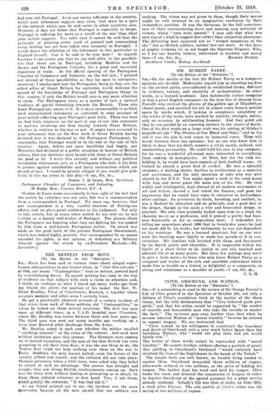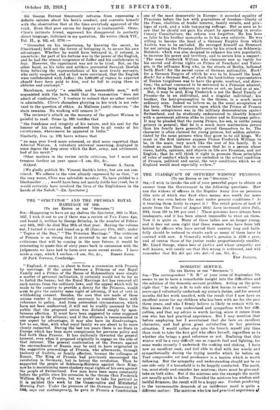CLIVE, OMICHUND, AND WATSON.
[To THE EDITOR or THE " SPECTATOR."] SIR,—It is astonishing to read in the review of Sir George Forrest's Life of Clive printed in the Spectator of October 5th, not .only a defence of Clive's scandalous trick in the matter of the sham treaty, but the held declarations that " Clive behaved quite pro- perly," and that his action would be supported by " the verdict of sensible and honourable men who take the trouble to master the facts." The reviewer goes even further than that when he accuses Admiral Watson of "moral timidity" because he refused to commit forgery. We are instructed that
"Clive indeed in his willingness to counteract the treachery and deceit of Omichund, cuts a very much better figure than the fastidious Watson, Who would not play false and yet would falsely win.'" The writer of those words cannot be reproached with " moral timidity." He asserts further, without offering a particle of proof, that yielding to Omichund's blackmail " would certainly have involved the lives of the Englishmen in the hands of the Nabob."
The simple facts are well known, no trouble being needed to master them. Omichund demanded three millions of rupees, afterwards reduced to two millions, as the price of holding his tongue. The banker kept his word and held his tongue. Clive broke his word, and directed the commission of forgery in order to deprive Omichund of the agreed payment for a great service
already rendered. Nobody's life was then at Make, on June 30th,
a week after Plessey. The sole motive of Clive's crime was the saving of two millions of rupees.
Sir George Forrest timorously refrains from expressing a definite opinion about his hero's conduct, and contents himself with the observation that at the time everybody approved of the trick. Even that poor excuse for forgery is ivadmissibte. Orme, Clive's intimate friend, expressel his disapproval in perfectly direct language, italicized in my quotation. He writes (Book VII., .Vol. II., p. 182, ed. 1778) :-- " Grounded on his importance, by knowing the secret, he [Omichundj held out the terror of betraying it, to secure his own advantages. Whether he would have betrayed it, if refused, is uncertain: for part of his fortune was in the power of the English, and he had the utmost vengeance of Jaffier and his confederates to fear. However, the experiment was not to be tried. But, on the other hand, as his tales and artifices prevented Surajah Dowlah from believing the representations- of his most trusty servants, who early suspected, and at last were convinced, that the English were confederated with Jaffier; the 2,000,000 of rupees he expected should hare been paid to him, and he left to enjoy them in oblivion and contempt."
Marehman, surely "a sensible and honourable man," well acquainted _with the_ facts, held that the transaction " does not admit of vindication." I venture to submit that no other verdict is admissible. Clive's shameless glorying in his trick is not rele- vant to the question of ethics. As Malleson justly observes, " the stain remains. No washing will remove it."
The reviewer's attack on the memory of the gallant Watson is painful to read. Orme (p. 189) testifies that " the frankness and integrity of his nature, and his zeal for the honour of his nation, had endeared him to all ranks of his countrymen, wheresoever he appeared in India."
Similarly, Ives (p. 178) bears witness that
" no man ever lived more esteemed, or died more regretted than Admiral Watson.. A voluntary universal mourning, displayed in some degree the deep sense which the fleet, army, and settlement, had of his merit."
Other matters in the •review invite criticism, but I must not trespass farther on your space.—I am, Sir, &c., [We gladly publish Mr. Vincent Smith's letter, but are not con- vinced. We adhere to the view already expressed by us that, "at the very worst, Clive was splendide mendax. To have yielded to a blackmailer . . . would have been not merely futile but cruel, for it would certainly have involved the lives of the Englishmen in the hands of the Nabob."—En. Spectator.]



































 Previous page
Previous page